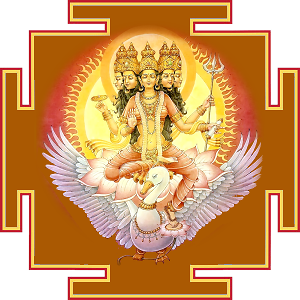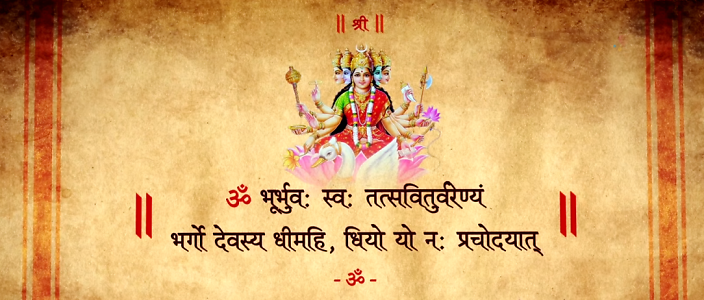The meaning of mantra
The Word mantra comes from the Sanskrit language of ancient India, in which humanity's oldest texts, the Vedas, are written. In its original sense, the term mantra refers to sound vibrations in the Vedic Sanskrit texts that have a particularly beneficial effect on consciousness.
The word mantra is composed of the two syllables "man" and "tra" derived from manas and trajate, which means "mind" and "liberating." A mantra is therefore a (spiritual) sound vibration that liberates the (materially polluted) mind.
The material pollution of the mind is removed through the mantra, allowing the soul to reflect itself in the spirit. By chanting (singing, reciting) mantras (spiritual sound vibrations), the consciousness is purified so that one can recognize the true inner self.
The Vedic scriptures describe a mantra as a spiritual sound vibration that has the power to liberate the materially polluted mind. Mantras are therefore spiritual sound vibrations that have the power to purify people's consciousness from materialistic tendencies and influences.
In order to see oneself in the mirror as one truly is, it must be free of dust. A dusty mirror has no reflective properties. Similarly, our mind, which is said to be the mirror of the soul, must be free of the dust of material contamination. This is what mantras are meant for.
In order to perceive the soul through the mind, it must first be purified. The material impurities of the mind are removed by the mantra so that the soul can then be reflected in the spiritual self.
The mind (manaḥ), which is described as the repository of a person's thoughts, feelings and desires, has a very unsteady nature. In everyday life, we have often experienced how the flow of thoughts carries us away from important things and makes us lose concentration, or how we act unexpectedly or even undesirably for ourselves when taken over by emotions. This is an obstacle both in the material realm and on the spiritual path. This is why traditional yoga-systems consider it crucial to learn how to control one's own mind.
Mantras are sound vibrations that connect us with a higher spiritual reality. Self-knowledge and God-realization is therefore the real goal of mantra-recitation/ meditation.
A mantra (spiritual sound vibration) has exactly this power, namely to free the mind from material dualities and to direct the consciousness to the presence to the inner self and God in the heart. This is the direct meaning of the word mantra.
Precisely articulated sounds and words have great power. They can frighten, scare or delight us, depending on how they are used. Mantras can also heal or kill. »You scared me to death« is a well-known saying that we all know.
The sound vibration of a mantra contains complete creative power in its structure. The sound-viration carries the power. A devotee (bhakta) who recites mantras (sacred syllables) for self-realization catches the power integrated in the sound of the words, even if he does not immediately understand the meaning of the mantra.
Chanting (singing, reciting) mantras (spiritual sound vibrations) purifies the consciousness, so that one can recognize the true inner self, which is different from the material body. As the driver of a car is always different from the car, in the same way is the soul always different from his material encagement.
Bonafide mantras are therefore very helpful in spiritual realization. Among the multitude of Vedic mantras, the Hare-Kṛṣṇa-mantra is called the mahā-mantra (the »preeminent, most important mantra«) because it is composed of the personal names of God: Hare Kṛṣṇa, Hare Kṛṣṇa, Kṛṣṇa Kṛṣṇa, Hare Hare, Hare Rāma, Hare Rāma, Rāma
Rāma, Hare Hare. » more here The Hare-Kṛṣṇa-maha-mantra



